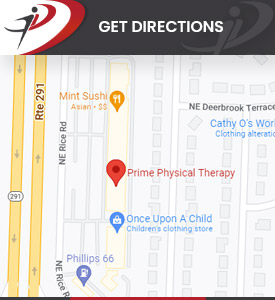Neurological Physical Therapy Specialist in Lee’s Summit, MO
Neurological physical therapy is designed to help people with brain and spinal cord diseases such as stroke, spinal cord injury, and Parkinson’s disease function as well as possible. Prime Physical Therapy provides neurological physical therapy. Dr. Kyo Hwang, PT, DPT, and his staff may aid in the recovery of neurological injuries as well as the prevention of the progression and aggravation of chronic neurological diseases. For more information, contact us today or book an appointment online. We are conveniently located at 1161 NE Rice Rd Lee’s Summit, MO 64086.


Table of Contents:
What does a neurological physical therapist do?
What is the difference between neurological physical therapy and physical therapy?
What conditions are treated with neurological physical therapy?
Why would someone need neurological physical therapy?
A neurological physical therapist specializes in treating patients with conditions and injuries that affect the nervous system, such as spinal cord injuries, stroke, Parkinson’s disease, and multiple sclerosis. They use physical therapy techniques and exercises to help patients improve their movement, strength, and coordination, as well as manage symptoms such as pain, spasticity, and balance problems. Neurological physical therapists also work closely with other healthcare professionals to develop and implement treatment plans that meet the unique needs of each patient.
The main difference between neurological physical therapy and physical therapy is the conditions they treat. Neurological physical therapy focuses on treating patients with conditions and injuries that affect the nervous system, such as spinal cord injuries, stroke, Parkinson’s disease, and multiple sclerosis. Physical therapy, on the other hand, is a broader field that treats a wide range of patients with various musculoskeletal and neuromuscular conditions, including sports injuries, back and neck pain, and post-operative rehabilitation.
Additionally, neurological physical therapists have specialized training in assessing and treating patients with neurological conditions, and they use specific techniques and interventions to help patients improve their movement, strength, and coordination. Physical therapists also have specialized training, but it is more general in nature and not specific to neurological conditions.
In summary, both professions specialize in physical therapy, but neurological physical therapists have a specific area of expertise and focus on patients with neurological conditions.
Neurological physical therapy specializes in treating patients with conditions and injuries that affect the nervous system, such as:
● Spinal cord injuries – Therapists work with patients who have had a spinal cord injury to help them regain movement and function, manage pain, and improve their overall quality of life.
● Stroke – Therapists work with stroke patients to help them regain strength, coordination, balance, and the ability to perform activities of daily living.
● Parkinson’s disease – Therapists work with Parkinson’s patients to help them improve their balance, mobility, and coordination, as well as manage symptoms such as stiffness and tremors.
● Multiple Sclerosis – Therapists help people with multiple sclerosis maintain mobility, strength, and balance.
● Brain injury – Therapists work with patients who have suffered a brain injury to assist them in regaining their range of motion, increasing function, and managing pain.
● Neuromuscular disorders – Conditions such as Muscular Dystrophy, ALS, and Cerebral Palsy, can benefit from neurological physical therapy.
● Other conditions – Conditions such as peripheral neuropathy, Guillain-Barré syndrome, and spinal muscular atrophy can benefit from neurological physical therapy.
You may need neurological physical therapy if you have a condition or injury that affects the nervous system. These conditions can cause a variety of symptoms, such as loss of movement or sensation, weakness, spasticity, pain, and balance problems, which can make it difficult to perform daily activities and maintain independence. Neurological physical therapy can help by:
● Improving movement and function – Neurological physical therapists use exercises and techniques to help patients regain strength, coordination, and the ability to perform activities of daily living.
● Managing symptoms – Specialists can help patients manage symptoms such as pain and balance problems.
● Improving the overall quality of life – By helping patients regain movement and function and manage symptoms, neurological physical therapy can help improve patients’ overall quality of life.
● Preventing secondary complications – Neurological physical therapists work to prevent secondary complications such as contractures, muscle and joint pain, and pressure sores.
● Adapting to the new abilities and limitations – Specialists can help patients to adapt to new abilities and limitations caused by their condition and learn to use assistive devices if necessary.
In summary, you might need neurological physical therapy if you have a condition or injury that affects the nervous system. You are experiencing symptoms such as loss of movement or sensation, weakness, spasticity, pain, and balance problems that make it difficult to perform daily activities. Working with a neurological physical therapist can help you manage your symptoms, improve your overall quality of life, and prevent secondary complications. Visit our compassionate team for neurological physical therapy. For more information, contact us today or book an appointment online. We are conveniently located at 1161 NE Rice Rd Lee’s Summit, MO 64086. We serve patients from Lee’s Summit, MO, Blue Springs, MO, Independence, MO, Raytown, MO, Lake Lotawana, MO, Greenwood, MO, Grain Valley, MO, and surrounding areas!
Check Out Our 5 Star Reviews



Additional Services You May Need
▸ Physical Therapy
▸ Manual Therapy
▸ Neurological Disorders
▸ Concussion Therapy
▸ Vestibular Rehabilitation
▸ Sports Medicine
▸ Kinesiotaping
▸ Dry Needling
▸ Graston Technique
▸ Trigger Point Release
▸ Neural Mobilization
▸ Muscle Energy Technique
▸ Joint Mobilization
▸ Knee Pain
▸ Soft Tissue Mobilization
▸ Electrical Stimulation
▸ Headache/Head pain
▸ Shoulder Pain
▸ Low Back Pain
▸ Ankle/Foot Pain
▸ Dizziness
▸ Arthritis Rehabilitation
▸ Multiple Sclerosis
▸ Parkinson’s Disease



